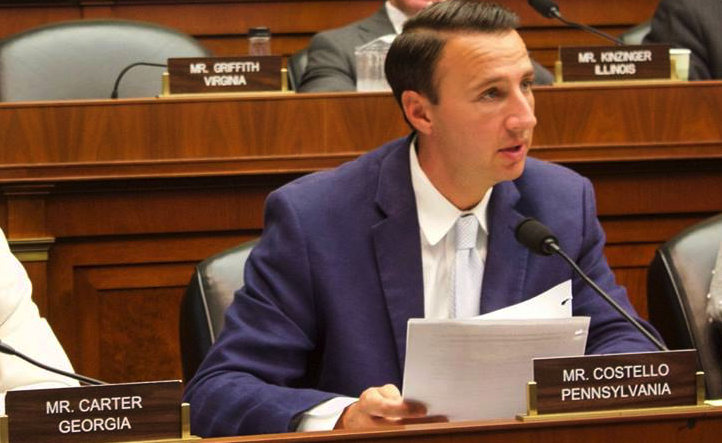Opinion: Refocusing the Healthcare Debate

Rep. Ryan Costello (R-PA)
It is time to refocus the healthcare debate on patient-centered solutions that can achieve bipartisan consensus in Congress.
Aware of the distinct possibility that the Senate might not pass a healthcare bill, a bipartisan group of House members called the Problem Solvers Caucus set out to find agreement on a set of principles that would address the most urgent issues confronting America’s healthcare system – stabilization of the individual market.
Instability in the individual marketplace is the biggest immediate threat facing families, medical professionals, employers, and our healthcare system. Reforms, anchored from the practical, ideological center, must address this immediately.
What, exactly, do I and the other Problem Solvers Caucus members propose?
First, end the uncertainty surrounding the federal government’s Cost Sharing Reduction payments (CSRs). CSRs enable more than 200,000 Pennsylvanians to purchase low-deductible, high-quality health insurance through the individual marketplace. With a late September deadline looming for insurers to commit to the 2018 marketplace, certainty of CSRs remaining intact is necessary for insurers to make that commitment.
The uncertainty created by the Trump administration’s threats to end CSRs leaves Pennsylvanians facing the possibility of higher premiums and fewer options for coverage. It also destabilizes the marketplace. Our proposal would remove the uncertainty surrounding this issue by vesting it as part of the legislative appropriations process and remove it from purely executive prerogative.
Reasonable governing is imperative. We must encourage, not discourage, participation in insurance markets. More participation creates stronger markets, and leads to greater competition that will ultimately deliver the choice and affordability that Pennsylvania families deserve.
Second, let’s refocus the broader debate on health care to encourage innovation and enhance flexibility at the state level. Concepts such as State Innovation Waivers provided under the Affordable Care Act (ACA) and in the recent American Health Care Act (AHCA) proposal offered in the House are policies that have traditionally garnered strong bipartisan support. So let’s do it.
States like Pennsylvania are working to find innovative ways to achieve health savings without sacrificing patient benefits or the quality of care provided. We stand to benefit from a streamlined innovation-waiver process that encourages states to make the most out of available federal healthcare dollars.
To date, though, a lack of clear regulatory guidance from the federal government and failure to provide necessary technical assistance has prohibited states from achieving this potential.
Our proposal provides direct and technical corrections to facilitate this innovation without sacrificing critical patient protections for preexisting conditions or essential health benefits. We can encourage states to continue to lead by adopting innovative policies that meet the needs of their unique populations. It need not be by federal agency fiat.
Third, many of the provisions of the ACA have negatively impacted job creators — and, in fact, many workers — without an appreciable impact on affordable access to care. The employer mandate has especially placed a regulatory burden on smaller employers and served as a disincentive for small businesses to grow past 50 employees.
The ACA also inadvertently shifted the workforce for many to part-time by challenging the long-practiced 40-hour work week. Our proposal suggests raising the employee threshold to 500 — realigning the ACA definition of “small business” with other federal programs — and reestablishing the employee expectation of the traditional work week.
The ACA’s medical-device tax has inhibited job growth and expansion for many local businesses. Our proposed repeal of this tax would enable many local businesses to innovate, grow, and deliver new jobs and economic opportunities. More innovation also brings about improved public-health outcomes.
Volatility in the insurance market is creating instability that threatens millions of Americans with unsustainable premiums. A goal of both Democrats and Republicans has been to reduce premiums. But it has become clear that particular objective was not going to be achieved under the current system or the proposed reforms. Our proposal creates a dedicated “stability fund” that states can use to reduce premiums and limit losses for providing coverage — especially for those with preexisting conditions. This concept was included in the AHCA.
These proposals outlined by the Democrats and Republicans on the Problem Solvers Caucus are not the permanent — or anywhere near the entire — solution to the challenges facing our healthcare system. But they are a start toward meaningful and sustainable reform, and they address the immediate threat of market instability. It is my hope and intent that they are also a start toward restoring the confidence of the American public that our legislative institutions can put partisanship aside to solve problems.
Connect With Your Community
Subscribe to stay informed!
"*" indicates required fields























![95000-1023_ACJ_BannerAd[1]](https://vista.today/wp-content/uploads/2023/03/95000-1023_ACJ_BannerAd1.jpg)


























